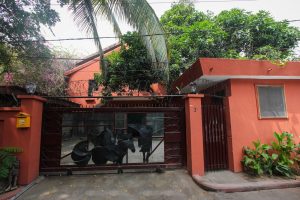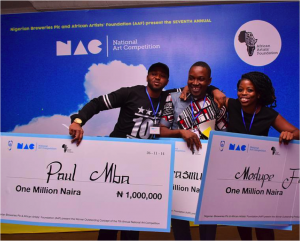Essence of founder of the African Artists’ Foundation, Azu Nwagbogu, becomes more real as he wins 2021 edition of the Royal Photography Society Award for Curatorship, AKEEM LASISI writes
Since highly resourceful Azu Nwagbogu emerged on Africa’s arts scene going to two decades ago, he has remarkably been impacting on its growth. Highly imaginative, indefatigable and revolutionary in its strides, Azu, as he is popularly called, came in at a time the sector really needed someone like him. There was the need for another kind of renaissance, deconstruction and intra- as well as inter-sectorial re-engineering. Besides, since man shall not live by passion alone, there was the need for a force that could create new opportunities for financial enhancement for artists, especially in Nigeria that is constantly in the eye of depression.
That was when Azu, who was also elected as the Director of the Zeitz Museum of Contemporary Art in South Africa, from June 2018 to May 2019, stepped out with his astute mind, inspiring human relations and winning accent – not just verbal accent but also that of public relations. The industry needed a new language and someone who would be able to speak and propagate it. There was the need for fresh engagements, innovative ideas and novel projects. And so came on the well-thought-out African Artists’ Foundation in 2007. Fifteen years after running it for the good of all, Azu has not only become a household name on the continent, he has also been attracting deserved recognition.

The latest of such is the Royal Photography Society for Curatorship Award for 2021, given by the legendary society otherwise called RPS. According to the influential platfom, Azu is recognised “for his work as Founder and Director of the African Artists’ Foundation, a non-profit organisation based in Lagos, Nigeria.” With the covetous award, Azu’s interventions in the arts business have thus affirmed him as the gold fish that has no place to hide. For someone who has imbued the industry with so much passion, the award is more or less an artistic justice.
The RPS anointing was awarded late October. Interestingly, that was a few days to the commencement of the LagosPhoto Festival 2021, another iconic brainchild of the celebrated curator. The eclectic feast is still on in the highly commercial city whose cultural side the likes of Azu have phenomenally kept alive. It will run till December 4.
Azu is, understandably, excited at the RPS award. But he is quick to note that the honour does not belong to him alone. Rather, he says, all the great people he has worked with are entitled to it too. He has a long list of names, to the extent that listing them here without being exhaustive may not do justice to his intention.
“When you win an award like that, it not just about you,” he says. “It is also about everyone who has been involved in supporting what you have been doing from the beginning. It is really like a credit to everyone who has been part of the team because they have all contributed to get us to where we are.”

He recalls that when they were launching out, there were not many events going on in Nigeria on an annual basis. But the AAF enduringly filled the gap. It particularly distinguished itself by bringing international audience into the country, thus deepening and pluralising discourse, products and creation processes.
“So, I’m very proud to get the RPS Award for Curatorship. It shows that someone is actually watching the modest efforts we are making. It is a testament to what we have been doing,” Azu adds at the Kofo Abayomi, Victoria-Island, Lagos office of the AAF, where Phenomenal.com.ng met him.
Chatting with him has rewards that transcend reporting. He thinks deeply about the essence and direction of African arts and he can easily infect you with such. It is the same way he wants artists themselves to think as he does not encourage flat arts. According to him, the chisel, scalpel, paints and the brush should not work in isolation from the people’s history, geography, education, culture, their commerce and politics. It is upon deep reflection and cross-pollination of ideas and the the ideals that grand works will emerge, he says. It is thus not surprising that virtually all the artists attracted to the LagosPhoto Festival and AAF’s other projects are those with profound and usually synthetic perspectives. Style-wise too, Azu fancies loaded dexterity.

He had earlier defined this in an interview with Mariella Franzoni, a researcher, independent curator and advisor based in Barcelona (Spain) and Cape Town (South Africa): “I also do not trust anyone in the art world without a sense of style. I think it’s important to be yourself and allow your individuality shine through and grow all you do. A lot of artists/curators are too busy trying to wear opinions like fashion and be the next cue in any famous name but unaware that the world is waiting for the unique individual. The chain becomes tiresome. It is also very important to be adaptable. A leader listens to those around him and surrounds himself with people with qualities that he admirers or is a little deficient in.
“My approach is to question everything and constantly challenge myself. Never do things because it is the way it has always been done but rather the way it should be. I consider that the lack of critical thinking is more common in an over professionalised setting: they sound like robots and all the exhibitions look the same. Sometimes during studio visits with an artist in her studio, the gallerist would get involved and want to make the artist sound cleverer and they offer you anodyne and platitudes when you’re desperate to get to the core of the motivation behind some of the work.”
Yet, Azu’s contributions to the growth of the sector goes beyond the abstract. He has done well to bring African artists together through his many projects. From the networking he inspires, new relationships and projects have been emerging. Also, at individual and group levels, it can be argued that Azu is helping to create better artists. The ambience of his operations encourages sharing of ideas and outright learning and unlearning in some cases.
The AAF boss has, of course, been helping to enhance earnings – financial – on the part of many practitioners. He serves as an intermidiary between funders and artists at times, just as some of his programmes are those that have directly blessed participants’ purses.

An example is the National Arts Competition he, in conjunction with Nigerian Breweries ran for 10 good years, yielding winners at the end of every year, with multiple rewards accompanying it. When the Royal Photography Society thus installs Azu as its Curator of the year, it has simply spoken on behalf of many stakeholders. The awards come alongside those of 17 other practitioners who are mostly practicing artists.
The Royal Photographic Society Awards are the world’s longest running and most prestigious photography accolades.
The organisers add in their profile, “Now in its 143rd year, the awards recognise individuals working across both still and moving image. The Awards celebrate significant achievements, showcase new and emerging talent, and highlight notable contributions from RPS members. The 2021 recipients tell remarkable stories, and their work is a testament to the power of photography to inspire, uplift, incite change and bring about personal, social, and cultural wellbeing.



